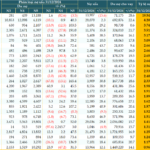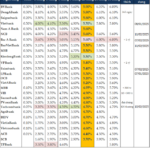Governor of the State Bank of Vietnam, Nguyen Thi Hong, emphasized the importance of macroeconomic stability as the foundation for sustainable economic growth at the Government Conference with localities on implementing the Conclusion of the Central Committee, National Assembly, and Government resolutions on economic growth, held on February 21 in Hanoi.

Governor Nguyen Thi Hong speaks at the Conference – Photo: VGP/HT
|
Macroeconomic Stability: The Foundation for Sustainable Growth
In the context of global and domestic economic volatility, Governor Nguyen Thi Hong affirmed that the banking sector would thoroughly grasp the spirit of breakthrough growth, contributing to the economic growth target of 8% and above. This lays the groundwork for high economic development in the following years. However, alongside the growth objective, the State Bank also emphasized controlling inflation, maintaining macroeconomic stability, and ensuring the economy’s major balances.
The Governor analyzed: 2025 is predicted to be a year of unpredictable changes, both globally and domestically. With Vietnam’s highly open economy, global trade tensions, especially the Trump administration’s trade policy changes, will put significant pressure on the financial and monetary markets.
This requires the State Bank to proactively adjust monetary and exchange rate policies to respond promptly. Domestically, although the economic situation has improved, businesses and people still face challenges. This poses a significant challenge for the banking sector in supporting the economy.
One of the State Bank’s top priorities is to closely monitor global and domestic economic developments and proactively devise appropriate solutions and governance tools. The aim is to control inflation at around 4.5-5% while stabilizing the monetary market and ensuring the safe operation of the banking system. This is considered a crucial foundation for achieving sustainable growth.
Credit Growth of 16%, with a Focus on Small Businesses
Given this context and the goal of breakthrough growth, Governor Nguyen Thi Hong outlined the banking sector’s key areas of focus to contribute to sustainable growth.
First, the State Bank closely monitors global and domestic economic developments and proactively offers solutions and tools with appropriate timing and dosage to help control inflation, stabilize the macroeconomy, stabilize the monetary market and banking activities, and ensure the system’s safe operation. This is a crucial task and the foundation for the economy’s sustainable growth.
Second, the State Bank identified efficient credit growth as a critical focus, as our economy still relies on the banking system’s capital. In 2025, the State Bank set a target of around 16% and communicated this to credit institutions at the beginning of the year so they could prepare.
“This year, we will base our assessment on the inflation target of approximately 4.5-5%. If the actual situation allows for lower inflation control, we may adjust credit growth. Conversely, if inflation poses a risk, we will report and make policy adjustments,” said Governor Nguyen Thi Hong.
To support the capital source for high credit growth, the Governor stated that she had directed relevant units to review the legal framework to ensure that the channels for deploying funds have the necessary legal basis if economic growth support measures are required.
The State Bank will continue to instruct credit institutions to implement credit packages, such as the 100,000 billion VND package for the seafood industry and the 120,000 billion VND package for housing support.
The head of the banking sector added that interest rates and exchange rates are variables that will impact the domestic market and capital inflows and outflows. The State Bank is closely monitoring developments, even on a daily basis, to proactively regulate these variables.
Regarding interest rates, the State Bank’s leadership affirmed that they are closely following the Government’s directives and continue to instruct credit institutions to reduce costs to further lower interest rates and support businesses and people. However, interest rate management must be combined with overall management regarding exchange rates.
Specifically, on exchange rates, the banking sector’s leadership believes that the core issue is foreign currency supply and demand. Currently, the exchange rate is under pressure, and the Government has directed ministries and sectors to find solutions to harmonize trade with major partners to avoid being placed on a tariff list.
Regarding the real estate sector, the Governor said that while outstanding credit in this sector is currently at 3.48 quadrillion VND, many projects are facing difficulties. The State Bank proposed resolving these issues to bring money back into the banking system, improve capital circulation, and enhance credit activity efficiency.
From a macroeconomic perspective, the Governor suggested that to achieve high growth, it is necessary to maximize input factors, including capital. As our economy’s nature is that savings are insufficient to meet investment demands, capital must be mobilized from both domestic and foreign sources.
Therefore, ministries and sectors are studying and reviewing ways to improve the efficiency of foreign capital mobilization and utilization.
The Governor expressed strong agreement with the direction of reform and removing obstacles, reducing intermediary layers, and shortening project approval and implementation times. This also improves capital efficiency and increases the opportunity for capital to circulate, enabling the banking sector to continue expanding credit to businesses and people and facilitating lower lending interest rates.
The State Bank’s leadership also emphasized that labor productivity and innovation are crucial drivers of economic growth. Therefore, the State Bank called on ministries, sectors, and businesses to focus on enhancing labor productivity and promoting innovative solutions.
The State Bank representative proposed that the Government continue to direct ministries and sectors to coordinate and promote the effectiveness of support solutions for small and medium-sized enterprises while assessing housing needs to develop appropriate solutions.
Regarding housing credit, the banking sector is determined to allocate financial resources from the system. However, not all low-income earners aspire to borrow to own a home.
“Therefore, the State Bank has proposed that the Government direct the Ministry of Construction to coordinate with localities to assess the demand for home ownership, rental, or rent-to-own options. The banking sector will focus on providing credit to low-income earners who wish to own a home and meet the loan eligibility criteria,” affirmed the Governor.
– 14:45 21/02/2025
How to Prevent Bad Debt from Becoming an Economic Hindrance?
The rising tide of non-performing loans is a significant challenge for Vietnam’s banking system. It is not merely about managing bad debt but also about building a foundation for businesses to thrive and grow in an ever-changing world, ensuring that non-performing loans do not hinder the development of the financial system.
Inflation Management Must Stay Grounded in Reality from the Start
In 2024, the consumer price index (CPI) rose by an average of 3.63% compared to 2023, remaining below the target set by the National Assembly. This marks a decade of Vietnam’s successful inflation control, with an average rate below 4%. Experts suggest that maintaining a CPI increase of around 4.5% in 2025 to support a substantial 8-10% growth will be a challenging task, requiring decisive and meticulous management from governing bodies from the get-go.
Unlocking Vietnam’s Economic Potential: Navigating the Path to 2025 with Optimism and Caution
According to the latest report by Standard Chartered Bank, Vietnam’s economy is projected to grow by 6.7% in 2025. With a forecasted growth of 7.5% in the first half and 6.1% in the latter half compared to the same period last year, this expansion is driven by robust business activity and sustained foreign investment.





















